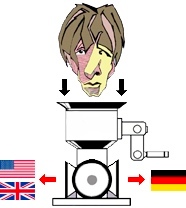| Pages in topic: [1 2 3] > | Online translation market: How is the current model able to sustain itself? Thread poster: dale newton
|
|---|
Hi,
First off not a translator myself primarily - I teach but I occasionally do translations for my own clients if they need them.
I have a young friend who's looking for work and speaks 4 languages and has a degree so I suggested looking for translation work. To get him going I took a look online for the sources of work which exist these days and although I hadn't been entirely oblivious to the trend I came away kind of shocked at how bad the conditions are with the ... See more Hi,
First off not a translator myself primarily - I teach but I occasionally do translations for my own clients if they need them.
I have a young friend who's looking for work and speaks 4 languages and has a degree so I suggested looking for translation work. To get him going I took a look online for the sources of work which exist these days and although I hadn't been entirely oblivious to the trend I came away kind of shocked at how bad the conditions are with the major translation agencies.
Immediately obvious, and puzzling in themselves for me, are the 'service fees' and general rates of the agencies. Gengoo and other market leading agencies apparently charge a 50-100% 'service fee', and rates go from 5 cents per word to 12 cents per word in the very highest 'tiers'.
I'm wondering how it's gotten the point where agencies are able to take so much of the value of the work done by the translator, and still maintain a dominant presence in the market. I seem to remember a decade or so rates being much better, but regardless the rates themselves and the effect of an increased number of translators in the marketplace, the existence of such a high level of economic 'rent' (50-100% service fee) precludes, as far as I can tell, any possibility that situation represents a point of equilibrium in the economic sense concerning the interests of the translator vs the agency.
Is there any logical explanation for this other than monopolization or other factors which violate free market conditions? Why has the translation community not been able to come up with a more sustainable, less exploitative means of finding work online, perhaps an online agency run by a translation association which does not operate on a for profit basis, or even a for profit basis but with less rent? Do such things exists? ▲ Collapse
| | | | Dan Lucas 
United Kingdom
Local time: 20:42
Member (2014)
Japanese to English
| Many, many explanations | Apr 26, 2020 |
dale newton wrote:
Is there any logical explanation for this other than monopolization or other factors which violate free market conditions?
Sure. The fact that you are cannot see beyond such explanations as monopolies rather implies that you aren't up to speed with the translation market. But you aware of that at some level, and you are here to find out more, which is commendable.
Let's start with efficiency. Clients who need to place, say, 150 jobs a year in various language pairs want to deal with two or three agencies rather than 150 freelancers. That's a huge reduction in admin work for them, which in turn means lower costs. The companies don't have to worry about finding and evaluating translators - and remember, this is an unregulated market, so anybody can claim to be a translator - or concern themselves with establishing availability, putting in orders, chasing up jobs, checking, editing, or billing. There are plenty of companies (so-called direct clients) that do work with freelancers, mind, but you have to find them.
The key concept of "finding" brings us to our second point: whatever the industry, if you are a good salesperson you will always have a job, or a good prospect of a job. It is hard to over-emphasise the importance of marketing, because without acquiring the customers your business simply will not work. It doesn't matter how advanced the product, how efficient it will make you, or how much it will cut costs: if you can't persuade people to buy it, you're dead in the water. Agencies understand this, and the successful ones doubtless have persons or teams who know how to approach other businesses.
Third point. Conversely, many translators do not seem to wholeheartedly understand this. Furthermore, not all those that do understand the importance of sales are able to convert that comprehension into effective action. I suspect many freelance translators are rather introverted, and have an academic linguist bent. In an ideal world they would be employees, not freelancers, because they don't actually like the push and shove of business.
And so we come to point four. This is a real business, not a public-sector job. It will involve not only the marketing mentioned above, but competition, differentiation, negotiation (yes, on pricing too!), and sometimes disagreements that may be, gasp, strongly worded. Clients may sometimes try to impose their will on the freelancer, and the freelancer must find a way of dealing with that pressure. If we take these forums as a proxy for the upper half of the freelance translation community, there seems to be a substantial body of freelancers here who don't like any the above, who find it distasteful, and would like it to be different. Nicer. Politer. Better paid. Less, ooh, I don't know, less difficult.
Inexorably this leads us to point five. Because such people don't have a good understanding of commercial interactions, we regularly see wild interpretations of what they are experiencing, often coupled with hare-brained proposals. Such as...
"Let's demand that they pay us more!" Fine, see how far that gets you. One problem is that many freelancers think that because they have linguistic skills and a degree they are entitled to charge the fees they want to charge. Nah. You're not entitled to success. There are plenty of skilled people working in burger joints. In a sea of freelancers, you need to identify some characteristic that lets you stand out from others. If you can do that, you have a better chance of finding the clients who are willing to pay. Markets tend to be pyramidal: the well-paid jobs make up a small percentage (10%?) at the tip, with the fee you can charge declining as you go down the pyramid. What has happened is that machine translation has started eating into the market from the bottom up, disintermediating those who focused on cheap, "good enough" translations, or who can't differentiate themselves.
"Let's form a union/bring in regulations!" Er, but it's a global market, you know that, right? If you unionise in Spain and demand more money without any increase in quality, or more money from clients who simply don't have the budget, won't clients just use a freelancer in another country? Same goes for regulation. This is what we have seen with the introduction of AB5 in California. As explained in that thread, some agencies are just not bothering to use CA freelancers any more, because they don't want the regulatory overhead.
"Let's band together and form a cooperative, just us freelancers, and not those blood-sucking agencies!" So, we'll need somebody to do the marketing and the administration, and sales as well, and we'll need somebody to cover the accounts - oh look, we've created... an agency! Except, in all likelihood, not a very good one. (When I see somebody arguing that agencies do nothing, or have it easy, I often wonder why they don't set up an agency themselves to make oodles of money. Remember, there's no regulation, so anybody can give it a go. Remember also that any freelance translator is free to turn down a job - they are not employees.)
But all these issues have been brought up many times on this forum, by many different people, over many years. There tend to be two tribes. The smaller tribe see in the vicissitudes of the translation market a reflection of the wider world of commerce, accept it for what it is, and are more or less successful. The larger tribe perceive their trials and tribulations to be unique to the translation market, are unable to accept the reality seen by the smaller tribe or find a strategy for dealing with it, and are more or less unsuccessful.
Anyway. It's Sunday morning, and I have work to do. I deal exclusively with agencies - though none, I think, in the top 10 or even top 20 - and they treat me well, and take care of all the marketing and other admin for me. There are good agencies, mediocre agencies, and bad / exploitative / predatory agencies, but I don't deal with the latter two categories, so for me it's a lucrative symbiotic relationship. Of course it takes work to keep that going, and sometimes you have to work at weekends to hit your deadlines. Ho hum.
I will finish with my standard advice for those, like your young friend, seeking to become translators. Go away, work in some other area, and come back in ten years when you have first-hand experience of finance, medicine, law, publishing, mechanical engineering, chemical patents or anything else that is in demand. Degrees are two a penny in today's world. Foreign language skills are common. Tens of millions of people can translate to some level or another. You must offer something to differentiate yourself from your peers.
Regards,
Dan
[Edited at 2020-04-26 09:04 GMT]
| | | | dale newton
Spain
Local time: 21:42
Spanish to English
TOPIC STARTER | Market efficiency / free market conditions. | Apr 26, 2020 |
Thanks for your detailed reply.
So, essentially your view is that the conditions offered by the large online translation firms do in fact represent a point of equilibrium consistent with free market conditions (not influenced by monopolization, power privileges, etc.), the market is efficient and fair, in economic terms, from the point of view of the interests of all (both clients and translation service providers) in that the 'service fees' taken by agencies and the per word transl... See more Thanks for your detailed reply.
So, essentially your view is that the conditions offered by the large online translation firms do in fact represent a point of equilibrium consistent with free market conditions (not influenced by monopolization, power privileges, etc.), the market is efficient and fair, in economic terms, from the point of view of the interests of all (both clients and translation service providers) in that the 'service fees' taken by agencies and the per word translation rates offered to translators can be fully explained by the amount of competition among translators, marketing, salesmanship, and the additional value agencies bring to clients.
Is that a fair summary of your view?
[Edited at 2020-04-26 09:18 GMT]
[Edited at 2020-04-26 09:20 GMT]
[Edited at 2020-04-26 09:21 GMT]
[Edited at 2020-04-26 10:59 GMT] ▲ Collapse
| | | | Dan Lucas 
United Kingdom
Local time: 20:42
Member (2014)
Japanese to English
dale newton wrote:
Is that a fair summary of your view?
With some caveats, yes, I believe that the market is working as one would expect a large, global, unregulated market to operate (and there aren't many of those).
I'm not sure what you mean by "online translation", as substantially all translation is conducted via the internet and has been for a couple of decades.
I also dislike the term "economic rent", as when used in its traditional sense it has the pejorative implication that no value is added by the party involved. I do believe that good agencies can in fact add value, and I believe that agencies can add value at different levels of the market and for different customers. The fact that some of those agencies may not pay freelancers as much as those freelancers would like doesn't mean that the agencies don't add value.
I would add that I would not deny that there are exploitative companies working in translation, just at there are in any field. The difference is that, as I noted earlier, there are no barriers to entry. The competition at the low end of the market is therefore fiercer, and the market more chaotic, than in a regulated industry with a high minimum hurdle, such as the legal profession.
Of course, this cuts both ways: in very few other professions can somebody set up a business as easily and as cheaply as they can in freelance translation. No investment is needed other than a PC an an internet connection, no specific regulations need be followed, and geography is not an issue. So in many ways freelancers are in a highly advantageous position.
There are two other issues that I think are important.
One is the asymmetry of pricing information. Briefly, agencies talk to many translators and can get a feel for the market rate more easily than freelancers, who don't tend to share such information freely. Some freelancers may be under-pricing their services relative to others at the same level of competence. This works to the advantage of agencies.
The other is order flow "stickiness". Because there is a morass of unqualified and incompetent individuals out there, the cost to an agency of acquiring a good freelancer is high. Accordingly, once they have found somebody they trust, the high cost of switching encourages them to use that translator for repeat business. This works to the advantage of freelancers.
Regards,
Dan
| | |
|
|
|
| Agencies are definitely a problem | Apr 26, 2020 |
Agencies are guilty of commoditising translation and changing it from a craft into a production line, pulling the wool over unsuspecting end-clients’ eyes.
I think that Dan’s stickiness only goes so far. The preferred model among the big agencies, even the good ones, is to have a pool of pre-qualified translators and feed the work to the cheapest of those. But this is I suppose normal business practice.
The best agency I’ve worked for is more like a theatrical ag... See more Agencies are guilty of commoditising translation and changing it from a craft into a production line, pulling the wool over unsuspecting end-clients’ eyes.
I think that Dan’s stickiness only goes so far. The preferred model among the big agencies, even the good ones, is to have a pool of pre-qualified translators and feed the work to the cheapest of those. But this is I suppose normal business practice.
The best agency I’ve worked for is more like a theatrical agent and actually goes out and gets me work that suits me. That adds more value for me and for the end-client.
But the best clients are end-clients who see me as an expert professional and trust me completely and just pay what I ask for and are grateful. ▲ Collapse
| | | | dale newton
Spain
Local time: 21:42
Spanish to English
TOPIC STARTER | edited my summary of your view | Apr 26, 2020 |
Dan Lucas wrote:
I also dislike the term "economic rent", as when used in its traditional sense it has the pejorative implication that no value is added by the party involved. I do believe that good agencies can in fact add value, and I believe that agencies can add value at different levels of the market and for different customers. The fact that some of those agencies may not pay freelancers as much as those freelancers would like doesn't mean that the agencies don't add value.
Regards,
Dan
Personally my opinion is precisely this, that there seems to be a considerable amount of economic rent in the fees charged, but this is not what you have expressed in your post, and you don't share that view so I have edited my reply where I have summarized your view, avoiding that term.
| | | | Dan Lucas 
United Kingdom
Local time: 20:42
Member (2014)
Japanese to English
| Commoditisation is not necessarily a negative | Apr 26, 2020 |
Chris S wrote:
Agencies are guilty of commoditising translation and changing it from a craft into a production line, pulling the wool over unsuspecting end-clients’ eyes.
That's rather like arguing that McDonald's is a problem because they brought about the commoditisation of eating outside the home, so that it is available to hundreds of millions of people every year as opposed to the few thousand that may grace the doors of establishments such as La Gavroche.
McDonald's does not offer cordon bleu-standard food, and some may look down on it, but it is convenient, affordable, and liked by many, many more people than any single restaurant. Whichever way you look at it, it's a success, and has created millions of jobs globally. And nobody is forced to work for them, please note. You can be a server, waiter, sommelier, or chef anywhere you can get it - doesn't have to be at the yellow arches.
As for craft versus industry... My view is that crafts only remain crafts if they have no wider relevance to society. If a craft is useful then it grows and develops into an industry, provided that costs fall over time to stimulate marginal demand. If costs stay high, take-up will be limited. So it is with translation: CAT tools and MT exist to get costs down and drive growth. I think we tend to worry too much about this. The development of the Ford Model T aimed at the mass market didn't lead to the end of luxury motoring. The presence of the major agencies focusing on high-volume multi-national clients will not lead to the end of skilled translation either.
Finally, I tend to believe that the "unsuspecting" man in the street, or client in the street, is much better informed, and far shrewder, than many people give him credit for. But we'll probably have to disagree on that.
Dan
| | | | dale newton
Spain
Local time: 21:42
Spanish to English
TOPIC STARTER | Association lead solution | Apr 26, 2020 |
Dan you make many valid points but in my judgement they don't fully sustain a point of view that the online translation market is truly a free market in the economic sense, and that the fees are fully reducible to value provided to the end client, which are probably the things that most motivated me to post.
Correct me if I'm wrong, but I understand that 50-100% of the fee charged is taken by the agencies. So, supposing a 100% service fee, the client pays the translator 100 euros, ... See more Dan you make many valid points but in my judgement they don't fully sustain a point of view that the online translation market is truly a free market in the economic sense, and that the fees are fully reducible to value provided to the end client, which are probably the things that most motivated me to post.
Correct me if I'm wrong, but I understand that 50-100% of the fee charged is taken by the agencies. So, supposing a 100% service fee, the client pays the translator 100 euros, the agency receives 100 euros and the client pays 200 euros. Or, supposing 50%, the translator is paid 100 euros, the agency receives 50 euros and the client pays 150 finally.
I don't differ from your view that all the things you mention do indeed amount to added value, but I don't believe they fully explain these percentages.
Just to confirm, is it your point of view that the reason that agencies run directly by associations/cooperatives don't exist is because they CANNOT, for basic financial/economic/business reasons, do the job of regular agencies in a way which results in a higher percentage of the fees charged to the client going back to the translator in the end than those charged by these agencies in question (50-100%)? Whilst I am not in a position to know precisely how all of the elements of the services provided by these agencies translate into business costs, which must obviously be passed on to the end client, personally I find this very hard to believe.
[Edited at 2020-04-26 12:13 GMT] ▲ Collapse
| | |
|
|
|
Dan Lucas 
United Kingdom
Local time: 20:42
Member (2014)
Japanese to English
| Yes, but on what grounds? | Apr 26, 2020 |
dale newton wrote:
Personally my opinion is precisely this, that there seems to be a considerable amount of economic rent in the fees charged
Well, I'm glad you have an opinion, but I don't see that it's based on any kind of objective analysis. How do you define and measure "economic rent"? If it's about profits, what level of profitability would you consider acceptable - margins of 10%? 30%? Maybe you use something like ROE or ROCE?
It's not easy to develop and maintain an informed view, which is why most of use have such views only in very limited areas of our lives, typically those with which we are most familiar.
Dan
[Edited at 2020-04-26 12:20 GMT]
| | | | | Economic rent | Apr 26, 2020 |
If there's more economic rent than reasonable, given that any business has to pay its costs, including salaries (including paid holiday and statutory sick and maternity pay), social charges of all sorts, taxes, real estate, insurances, accountants, legal advisors, software licences (much more expensive for an agency), IT hardware, IT support, website creation, maintenance and hosting, marketing, utilities, 'climate taxes' of all kinds, etc., then it would be quite simple for other agencies to pr... See more If there's more economic rent than reasonable, given that any business has to pay its costs, including salaries (including paid holiday and statutory sick and maternity pay), social charges of all sorts, taxes, real estate, insurances, accountants, legal advisors, software licences (much more expensive for an agency), IT hardware, IT support, website creation, maintenance and hosting, marketing, utilities, 'climate taxes' of all kinds, etc., then it would be quite simple for other agencies to provide cheaper translations and take a lot of the business.
In some jurisdictions such as France, there's also the cost of regulations that make it difficult or impossible to lay off staff when needed, for example if turnover plummets or an employee's performance isn't up to scratch. In France, an employee cannot be laid off for simply being a bit lazy but must have committed a 'serious error'.
There are many thousand agencies, so it's quite difficult to see why there would be any monopolies.
Analysing a few translation agencies’ annual accounts, provided they are available and affordable to access, should give us a better idea.
Of course, who wouldn’t like to be paid more? The struggle is to be in a position to turn down the lower end of the market and attract repeat business. ▲ Collapse
| | | | Tom in London
United Kingdom
Local time: 20:42
Member (2008)
Italian to English
| In the market | Apr 26, 2020 |
When you find yourself operating in a market you can't just succumb to it and let people walk all over you, imposing their rules on you. You have to find your own ways of playing in that market: things that are unique to you, based on things you know that nobody else could know. It's a question of working out what your own moves should be. I hear a lot of talk in these forums about how we're trapped in a market and that this market has a hold on us, treating us badly, ripping us off, squeezing u... See more When you find yourself operating in a market you can't just succumb to it and let people walk all over you, imposing their rules on you. You have to find your own ways of playing in that market: things that are unique to you, based on things you know that nobody else could know. It's a question of working out what your own moves should be. I hear a lot of talk in these forums about how we're trapped in a market and that this market has a hold on us, treating us badly, ripping us off, squeezing us out, etc. If you think that, you just don't understand the market. You need to get one over on all the people who are out to screw you, in this market. You need to be a player at the table, and you need to win. You need to work out where the clients are with whom you'd really like to work, and to whom you have something to offer, and then work out the best ways of making contact with those particular clients. I hate having to survive in a market economy but by God if that's the name of the game, then I'm going to play it as much as anyone else. Call it "one of the contradictions of living in late capitalism".
[Edited at 2020-04-26 12:54 GMT] ▲ Collapse
| | | | Brian Joyce 
United Kingdom
Member (2022)
French to English
| Trotters independent traders | Apr 26, 2020 |
I suspect many freelance translators are rather introverted, and have an academic linguist bent. In an ideal world they would be employees, not freelancers, because they don't actually like the push and shove of business.
Dan Lucas
Wouldn't be so bad if most business persons were not Del boy Trotters, such uncultured and uncouth people are beneath me.
| | |
|
|
|
Dan Lucas 
United Kingdom
Local time: 20:42
Member (2014)
Japanese to English
Brian Joyce wrote:
Wouldn't be so bad if most business persons were not Del boy Trotters, such uncultured and uncouth people are beneath me.
The problem is that I can never tell when he's being satirical and when he really means it...
| | | | Lincoln Hui 
Hong Kong
Local time: 03:42
Member
Chinese to English
+ ...
| Direct clients | Apr 26, 2020 |
If I just cared about pure income/time, I wouldn't work for direct clients even if they paid 100% more.
A proofreader's fee is between 30-50% of the translator's cost, so a mere 50% markup barely even breaks even.
| | | | Sadek_A 
Local time: 23:42
English to Arabic
+ ...
| Few thoughts | Apr 26, 2020 |
still maintain a dominant presence in the market
Without focusing on any specific name, I say they are not maintaining anything, they're not an active engine. Rather, they are simply a fireplace with wood "walking" right into it to be burned.
Wood here is the financially-gullible pool of "wannabe" linguists. They don't know their rights, and they don't realize that rates must offset the lack of employment benefits. Little do they know about what is waiting for them in the future. As a colleague put it here in a different thread:
You're being forced to work harder and harder to pay your bills, but your living conditions suffer the most. The question is how much longer you'll be able to keep that pace. Perhaps when we're young, we don't think about it, but when health issues appear, you'll realize that it wasn't worth giving away your efforts so cheap.
Also, you might want to check the bad reviews "dominants" are getting, to recognize their bad situation, not dominant presence, in the market.
A funny event would be when you see them crying their eyes out over being unable to place a tough/creative project with any of their five-figure number of translators, because the wannabe-part don't have the required experience and the seasoned-part (if any) don't get payment corresponding to such projects. But, the "dominants" are too stubborn to let go of their pathetic, carved-in-stone rates, to the point that they would reject the project altogether than see the seasoned linguist charge their own rate. After all, they don't want to establish a precedent T_T.
And, yes, there is monopolization. Don't be tricked by the different names, it's not hard for one-and-the-same entity to create dozens of translation portals under different names with different business models, to establish fake competition, fooling both clients and translators. Say client A tried, and didn't like, the services of company B, would it not be the smartest thing for company B to have back-up companies C, D, E, etc. to have the same client A fall into their lap again?! Additionally, a larger web-developing contract by company B should translate into better discounts by developer.
Last but not least, they have online presence which brings them some clients, but the better chunk of their business, i.e. large contracts, is brought on by their connections within organizations, institutions and establishments. Friends, family members, intimate partners, acquaintances, etc., who get well-rewarded for their "efforts" more than linguists themselves.
| | | | | Pages in topic: [1 2 3] > | To report site rules violations or get help, contact a site moderator: You can also contact site staff by submitting a support request » Online translation market: How is the current model able to sustain itself? | CafeTran Espresso | You've never met a CAT tool this clever!
Translate faster & easier, using a sophisticated CAT tool built by a translator / developer.
Accept jobs from clients who use Trados, MemoQ, Wordfast & major CAT tools.
Download and start using CafeTran Espresso -- for free
Buy now! » |
| | Protemos translation business management system | Create your account in minutes, and start working! 3-month trial for agencies, and free for freelancers!
The system lets you keep client/vendor database, with contacts and rates, manage projects and assign jobs to vendors, issue invoices, track payments, store and manage project files, generate business reports on turnover profit per client/manager etc.
More info » |
|
| | | | X Sign in to your ProZ.com account... | | | | | |













































